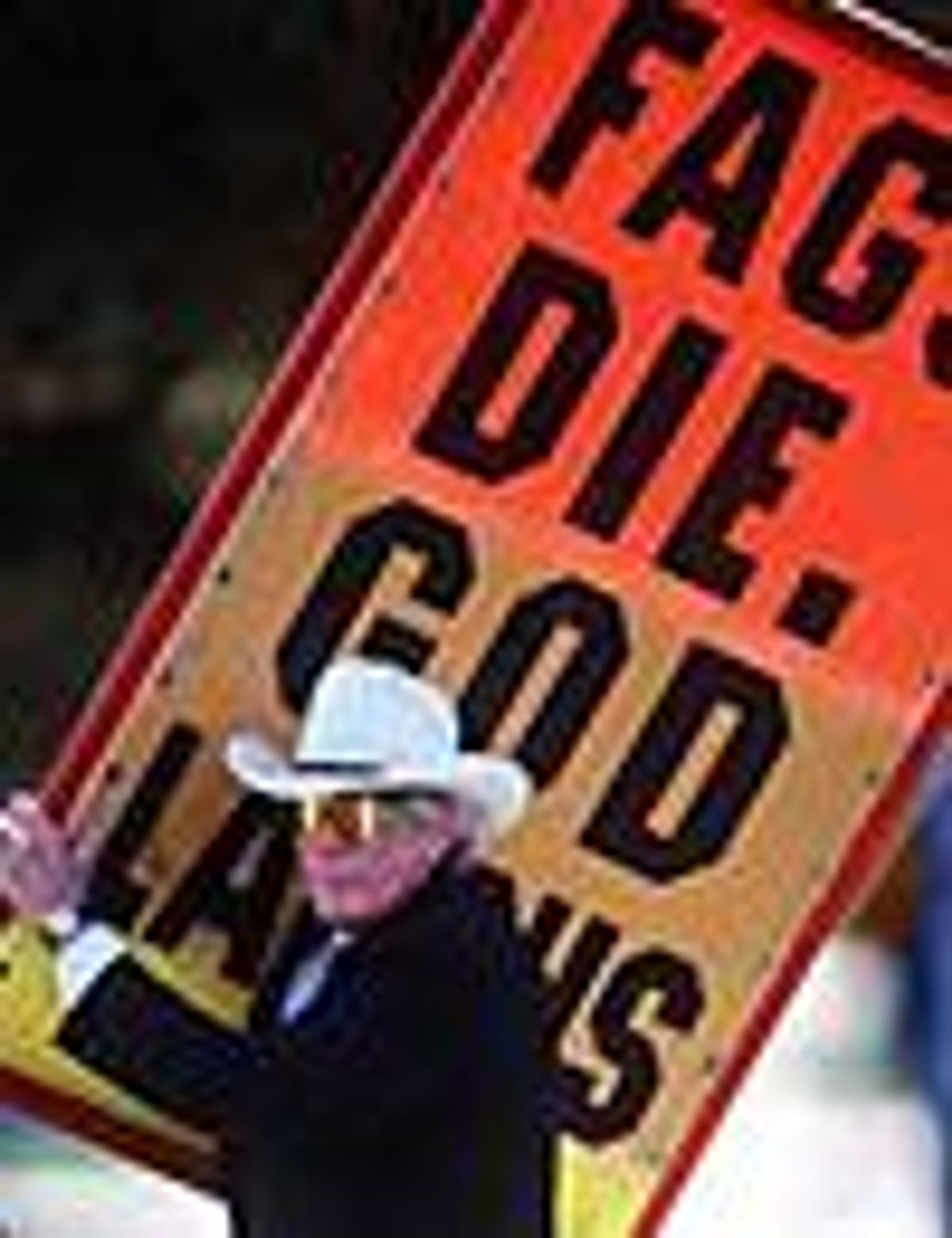Members of Fred
Phelps's fundamentalist Kansas church, ordered to
pay nearly $11 million in damages to a grieving father,
smiled as they walked out of the courtroom, vowing
that the verdict would not deter them from protesting
at military funerals.
Members promised
to picket future funerals with placards bearing such
slogans as ''Thank God for dead soldiers'' and ''God hates
fags.''
''Absolutely,
don't you understand this was an act in futility?'' said
Shirley Phelps-Roper, whose father founded the Westboro
Baptist Church.
The group
believes that U.S. deaths in the Iraq war are punishment for
the nation's tolerance of homosexuality. They say they are
entitled to protest at funerals under the First
Amendment, which guarantees freedom of speech and
religion.
Albert Snyder
sued the Topeka, Kan., church after a protest last year at
the funeral of his son, Marine Lance Cpl. Matthew Snyder,
who was killed in Iraq. He claimed the protests
intruded upon what should have been a private ceremony
and sullied his memory of the event.
A jury agreed. On
Wednesday, the church and three of its leaders -- Fred
Phelps and his two daughters, Phelps-Roper and Rebekah
Phelps-Davis -- were found liable for invasion of
privacy and intent to inflict emotional distress.
Jurors awarded Snyder $2.9 million in compensatory damages
and $8 million in punitive damages.
Snyder, of York,
Pa., said he hoped other families would consider suing.
''The goal wasn't
about the money; it was to set a precedent so other
people could do the same thing,'' he said.
Appearing on
NBC's Today show Thursday, Sndyer said that
while his son was fighting for freedom for Iraqis, ''my son
did not fight for hate speech.
''And that's
basically what it is,'' he said of the church's protest.
''Everybody's under the impression that the First Amendment
gives them the right to do anything, say anything
anywhere, anytime. And along with the First Amendment
also comes responsibility.''
Snyder said that
on the day of the funeral, he didn't see the protesters
or their signs, only the tops of the signs. ''But a lot of
people at the church did see it,'' he said. ''And it
was splattered all over the newspapers the next day.''
It's unclear
whether Snyder will be able to collect the damages.
The assets of the
church and the defendants are worth less than $1
million, mainly in homes, cars, and retirement accounts,
defense attorney Jonathan Katz said. The church has
about 75 members and is funded by tithing.
Craig Trebilcock,
one of Snyder's lawyers, had asked jurors to question
the truthfulness of the defendants' financial documents, one
of which show Phelps-Davis having only $306 in the
bank. He noted that Phelps-Davis is a practicing
attorney, who could afford to travel to spread the
church's message.
''Rebekah
Phelps-Davis has $306? She must be using Priceline.com. It
doesn't make any sense,'' Trebilcock said.
The attorney had
urged jurors to award damages that would send a message
to the church: ''Do not bring your circus of hate to
Maryland again.''
Trebilcock later
called the verdict ''Judgment Day for the Westboro
Baptist Church.''
''They're always
talking about other people's Judgment Day. Well, this is
theirs,'' he said.
Snyder sobbed
when he heard the verdict, while members of the church
greeted the news with tightlipped smiles.
They are
confident the award will be overturned on appeal, Phelps
said.
''Oh, it will
take about five minutes to get that thing reversed,'' he
said.
Another of
Snyder's attorneys, Sean Summers, said he would tirelessly
seek payment of the award. ''We will chase them forever if
it takes that long,'' he said.
A number of
states have passed laws regarding funeral protests, and
Congress has passed a law prohibiting such protests at
federal cemeteries. Snyder's lawsuit is believed to be
the first filed by the family of a fallen serviceman.
(Alex Dominguez, AP)


















































































Here's our dream all-queer cast for 'The White Lotus' season 4